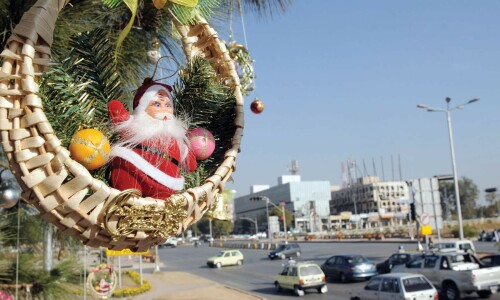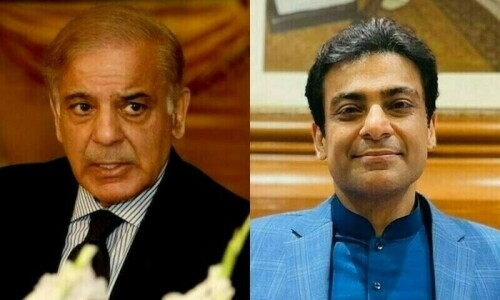The Life's Too Short Literary Review, the first edition of a magazine featuring new Pakistani writing, is now on the stands. The cover illustration depicts a parked ambulance on a typical Pakistani street — implying perhaps that this review is a saviour for the ongoing literary boom, which threatens to go bust in the absence of local publishing
outlets.
Indeed, editor Faiza Khan declares at the outset that the review is on a mission to encourage, promote and discover new talent.
The inaugural edition is thus a collection of the best short stories submitted for the short story competition held last year and judged by Kamila Shamsie, Mohammed Hanif and Daniyal Mueenuddin. Evolving from the competition, the review boasts brand new voices to the local literary landscape — and the strength of some of the entries bodes well for the future of English-language fiction in Pakistan.
Sadaf Halai's 'Lucky People' — the winning entry — is the most engrossing story. It tells the simple tale of Asma, a housewife who rents the ground floor of her house to a young, westernised couple. As she shares her space, Asma begins to articulate her silent frustrations — with her husband, their home, and lifestyle — by way of comparison with her hip tenants. In a few pages, Halai touches on the poignancy and pitfalls of familiarity, class difference, and existential musings, making her contribution a compelling read.
Rayika Choudri also introduces a sympathetic character in 'Settling Affairs.' This story is told from the point of view of Zaheer, a servant who remains loyal to his Begum Sahib for a decade, until her children throw him out with all her old things after her death.
Choudri's entry was selected as the second runner-up in the competition, an award it deserves for describing the tender moments in which the relationship between servant and mistress evolved — the few lines that reveal how Zaheer came to bathe his employer are particularly moving.
Other stories in the review that benefit from strong characterisation and emotive power include Danish Islam's 'Mir Sahib's Hairdo' and Bina Shah's 'Not Another Voice.' These stories also highlight the thematic and tonal variety of the review's offerings Islam's piece is unpretentious and comic, relating the day in the life of a vain gentleman who succumbs to his wife's nagging and dyes his snow-white hair with Kala Kola. Shah's story, on the other hand, captures the disorientation and devastation that plague the mother of a stillborn child. The isolation and crisis of faith that confront the dead infant's family is a far cry from Islam's levity.
The entries that narrate life-changing episodes also make for good reading. In Sarwat Yasmeen Azeem's 'The Wedding,' the joyful mock shaadi of two dolls enacted by a gaggle of excitable girls is interrupted by the real-life dissolution of one of their parents' marriage. And in Aziz Sheikh's 'The Six-Fingered Man' reality begins to seem more paranormal than a pir's magic when a shrine is blown up in conflict-ridden Kashmir.
For the most part the stories are engaging and insightful, and manage to shake off — in Khan's words — the 'burden of representing the mythical Real Pakistan.' Exceptions include 'Baby,' which feels derivative and adds little to the construction of an imagined Pakistan and 'Ruth and Richard.' The latter tries so hard not to falsely depict a 'mythical Real Pakistan' that it instead ends up describing a 'mythical Real Manhattan'.
To justify describing itself as a review — rather than a short story anthology — the volume includes creative work in various genres. Particularly noteworthy is the well-illustrated excerpt from 'Rabbit Rap', an upcoming graphic novel by Musharraf Ali Farooqi and Michelle Farooqi.
With a nod to Art Spiegelman's 'Maus,' it introduces a world of complacent rabbits, thereby critiquing contemporary approaches to corporate control and climate change. One looks forward to the complete work and hopes that it focuses on the individual stories of certain rabbit characters.
There is also a well-printed photo essay by Attiq Uddin Ahmed comprising iconic and amusing images of graffiti, billboards and neon signs from around Karachi. An archive section includes a scanned excerpt of early scribbles that eventually became Mohsin Hamid's The Reluctant Fundamentalist. Hamid's notes on structure — particularly his question about whether to conclude the novel with a 'Borgesian solution' — are bound to provoke anxiety among aspiring writers who do not have equally lofty first drafts.
Finally, the most titillating offering in the review is 'Challawa,' an excerpt from a local serialised 'pulp fiction' story by Sabiha Bano. Hanif's translation from the original Urdu is clever, lively and appropriately naughty without becoming tongue-in-cheek.
However, beyond relying on the story's shock value, the editors should have made an effort to contextualise the translation by providing some information about where, when and how the original was published and for which audience.
For those invested in the growth of a Pakistani literary canon in English, this is a much-needed and most welcome publication. One only hopes that, unlike previous literary reviews (some may remember the effort by Alhambra), this one is able to keep up the momentum and publish new works of quality with some frequency.
The Life's Too Short Literary Review 01 The magazine of new writing from Pakistan
(SHORT STORIES)
Edited by Faiza S. Khan
Siren Publications, Lahore
ISBN 978-969-9251-18-4
114pp. Rs395












































Dear visitor, the comments section is undergoing an overhaul and will return soon.